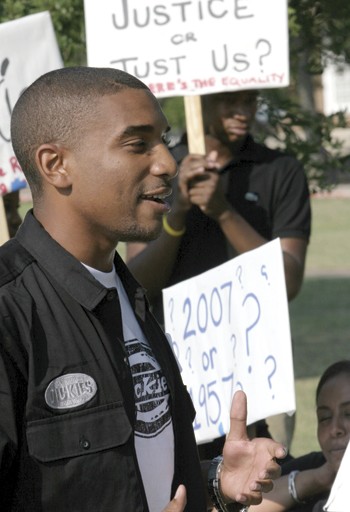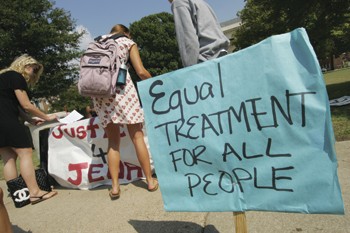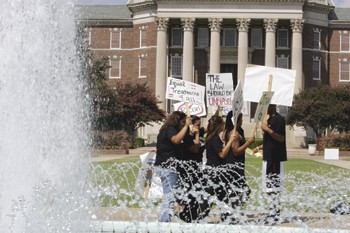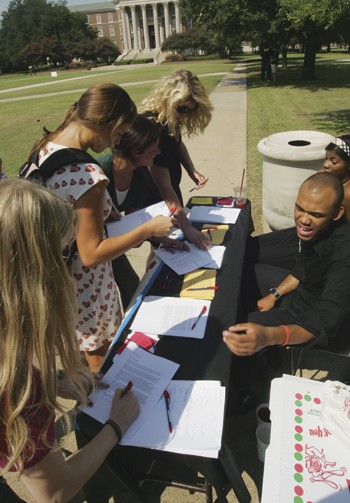
Sophomore Warren Seay shares his opinions on equality during the Jena 6 protest yesterday afternoon in front of Dallas Hall. (John Schreiber)
As thousands of protestors flocked to the streets of Jena, La. Thursday, members of the SMU community gathered around the fountain in front of Dallas Hall nearly 350 miles away. Sporting black outfits and signs with mantras like “Justice for Jena” and “Equal Treatment for All,” they planned to spread awareness about the Jena 6 and support Mychal Bell on the day of his appeals court date.
“It happened a year ago and there’s not enough media coverage about it,” junior and Assoc.iation of Black Students (ABS) member Jamil Beard. “We’re trying to get some light shed on it.”
The idea for the event came up during an ABS meeting and the word was spread through Facebook and e-mails, Beard said, who volunteered to head up the peaceful protest.
As part of the protest, held from 11 a.m. to 5 p.m. an hour for each of the six black students, attendees could sign a petition and also send at typed letter to the Governor of Louisiana and the Jena District Attorney.
“We’re just trying to give everyone the power to do something,” junior Courtni Gray said. “And I know we can’t talk to the judge and get it overturned, but we can give people knowledge.”
The story of the Jena 6 actually started in August of 2006 when a black student asked to sit under a tree at Jena High School typically reserved for white students. The following day three nooses were hung from the tree, something that the school district suspended three white students for, considering it a prank.
A series of racially charged fights in the community have escalated the incident, ending with six black students being charged with attempted murder after attacking a white student that was taunting them in December of 2006.
The white student was hospitalized for the injuries, but he was able to attend a social event later that day.
Since then the charges have been reduced to second-degree assaults and conspiracy charges. In line with the protest, Mychal Bell’s appeal court date on Thursday ordered a hearing within 72 hours to determine whether he can be released from jail.
According to youth minister D. Anthony Everett, who spoke after the gospel choir at the closing ceremony, supporters shouldn’t stop until he is freed.
“We will not be satisfied but to receive full civil rights,” Everrt said.
And many of the protesters believe that raising awareness is the way to achieve their goal.
“Without acts like this, people like me may not know about these problems,” Paul Quinn College freshman Joseph Adams said. “It wasn’t until I heard that students were protesting that I heard about the Jena 6.”
The situation in Jena is something that has been unpublicized for more than a year, and many people have not heard about the current situation in Jena.
“I’ve people come up to me and ask ‘Who’s Jena?'” junior and Alpha Kappa Alpha sorority member Shalisha Galloway said. “Jena is not a person, it’s a city.”
Some protestors believe that the city has been quietly writing this “shameful story of juvenile justice gone awry,” Evertt said in his speech to the group in the main quad.
“Things that happen in small towns tend to get overlooked,” Beard said. “It’s 2007 and this is stuff that happened in 1957 or ’67.”
But one thing that the protestors wanted to emphasize was that this is something that all races should get behind.
“This is not just a black and white issue,” Beard said. “This is about anybody being discriminated against.”

Signs dotted the lawn in front of Dallas Hall during the demonstration. (John Schreiber)

Students hold up signs in front of Dallas Hall. (John Schreiber)

Elliot Collins, vice president of the Association of Black Students, helps students sign petitions supporting the Jena 6. (John Schreiber)








